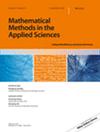分数积分微分方程的乘积积分技术
IF 2.1
3区 数学
Q1 MATHEMATICS, APPLIED
引用次数: 0
摘要
本文介绍了基于卡普托非整数导数的分数阶 Volterra 积分微分方程的近似积积分(API)数值解。此外,这一想法还扩展到一类具有弱奇异内核的分数阶 Volterra 积分微分方程。为此,我们利用 API 方法的概念以及 L1 和 L1-2 公式建立了两种数值方案。我们采用 L1 和 L1-2 离散法来逼近 Caputo 非整数导数。同时,在使用 API 方法近似所考虑的数学模型中的 Volterra 部分时,考虑了未知函数的泰勒级数展开。API 方法与 L1 和 L1-2 公式相结合,分别为方案一和方案二提供了收敛阶次。推导出的技术将所提出的模型简化为一组代数方程,可以使用著名的数值算法进行求解。此外,我们还对所制定方案的无条件稳定性、收敛性和数值稳定性进行了严格研究。最后,我们进行了一些数值实验,以验证我们的理论发现,并保证推荐方案的准确性和效率。我们还通过表格和图表对建议方案与现有数值技术的数值结果进行了比较。本文章由计算机程序翻译,如有差异,请以英文原文为准。
Product integration techniques for fractional integro‐differential equations
This article presents an application of approximate product integration (API) to find the numerical solution of fractional order Volterra integro‐differential equation based on Caputo non‐integer derivative of order , where . Also, the idea is extended to a class of fractional order Volterra integro‐differential equation with a weakly singular kernel. For this purpose, two numerical schemes are established by utilizing the concept of the API method, and L1 and L1‐2 formulae. We applied L1 and L1‐2 discretization to approximate the Caputo non‐integer derivative. At the same time, Taylor's series expansion of an unknown function is taken into consideration when approximating the Volterra part in the considered mathematical model using the API method. Combination of API method with L1 and L1‐2 formula provided the order of convergence and for Scheme‐I and Scheme‐II, respectively. The derived techniques reduced the proposed model to a set of algebraic equations that can be resolved using well‐known numerical algorithms. Furthermore, the unconditional stability, convergence, and numerical stability of the formulated schemes have been rigorously investigated. Finally, we conducted some numerical experiments to validate our theoretical findings and guarantee the accuracy and efficiency of the recommended schemes. The comparison between the numerical outcomes obtained by proposed schemes and existing numerical techniques has also been provided through tables and graphs.
求助全文
通过发布文献求助,成功后即可免费获取论文全文。
去求助
来源期刊
CiteScore
4.90
自引率
6.90%
发文量
798
审稿时长
6 months
期刊介绍:
Mathematical Methods in the Applied Sciences publishes papers dealing with new mathematical methods for the consideration of linear and non-linear, direct and inverse problems for physical relevant processes over time- and space- varying media under certain initial, boundary, transition conditions etc. Papers dealing with biomathematical content, population dynamics and network problems are most welcome.
Mathematical Methods in the Applied Sciences is an interdisciplinary journal: therefore, all manuscripts must be written to be accessible to a broad scientific but mathematically advanced audience. All papers must contain carefully written introduction and conclusion sections, which should include a clear exposition of the underlying scientific problem, a summary of the mathematical results and the tools used in deriving the results. Furthermore, the scientific importance of the manuscript and its conclusions should be made clear. Papers dealing with numerical processes or which contain only the application of well established methods will not be accepted.
Because of the broad scope of the journal, authors should minimize the use of technical jargon from their subfield in order to increase the accessibility of their paper and appeal to a wider readership. If technical terms are necessary, authors should define them clearly so that the main ideas are understandable also to readers not working in the same subfield.

 求助内容:
求助内容: 应助结果提醒方式:
应助结果提醒方式:


